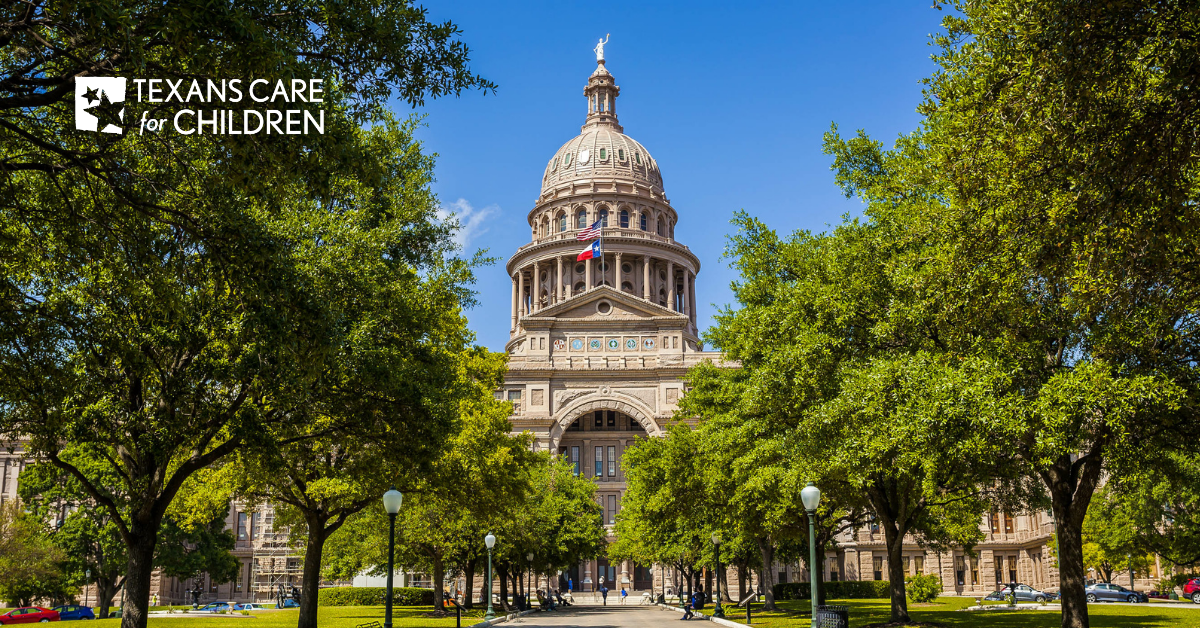This was an important week in the effort to protect and support kids in Texas foster care — although it will be even more important to see what state leaders do to follow up after this week.
On Tuesday, the panel of experts selected by the state and the plaintiffs in the Texas foster care lawsuit released their highly anticipated recommendations. They delivered their report as the federal court held another hearing regarding the lawsuit. Additionally, the Monitors appointed by the court released two more reports, underscoring the terrible conditions many Texas kids face in foster care — including kids whom the state has placed as far away as Michigan. The Monitors’ reports are here and here. You can read more about the reports and the hearing from the Dallas Morning News, KXAN, NBC DFW, Texas Tribune, and others.

One report by the Monitors includes the story of a night experienced by an eight-year-old girl in foster care, who brushed her teeth but then refused to go to bed. In her unlicensed facility, where she was supervised by untrained staff rather than nurtured by a family, this typical childhood experience quickly escalated. Fueled by the trauma she had already experienced, she soon began to spit, take off her clothes, and throw a tantrum. Staff called 911. A police officer arrived. Then another. The little girl explained that she was upset because she wanted to be with her brother. She broke down and cried. Eventually, after a bedtime story, she went to sleep.
We urge DFPS, HHSC, the Legislature, and the Governor to quickly follow the steps outlined by the panel of experts to make sure that kids in foster care, like this little girl, can live and heal with a foster family or an aunt and uncle instead of facing more trauma and instability in an institution, a CPS office, or a dangerous, unlicensed foster home. We know state agencies and local foster care providers are already working hard on some of these strategies, and we hope that state leaders will embrace the plan’s recommendations. While the report addresses children already in foster care, we also urge the state to implement these recommendations in ways that provide support earlier so children can stay safely with their families in the first place rather than entering foster care.
There were four themes that jumped out at us from the three reports and the hearing:
- In unsafe foster placements, trauma is continuing and escalating for kids. Not only that, but they are often blamed for acting out after they experience this trauma. The reports make clear that we need to stop blaming, traumatizing, and dehumanizing kids in foster care and start helping them heal. When kids experience an escalation of trauma and instability in foster care instead of healing and support, not only do children suffer, but it becomes harder to find families who can care for them.
- Families, not just better facilities, are the best option in foster care for kids with complex needs. There is a lot of attention right now on the important goal of getting kids out of these unofficial placements, like CPS offices, hotels, and unlicensed facilities. But the report makes clear that we need to make sure kids in foster care are with families — whether it’s a well-trained foster family or kinship care, like a grandparent or aunt and uncle — instead of just moving kids from unlicensed facilities into licensed group facilities or shelters.
- To place more of these kids with foster families or relatives, they need better mental health services in foster care. Providing these services is not only essential for helping children heal and thrive, but it’s also essential for making sure foster families have the support they need to take care of kids who are experiencing mental health challenges after so much trauma. Some of the panel’s specific mental health recommendations include increasing access and decreasing wait times for YES waiver services and developing respite care, mobile crisis, and Family Partners. Many of these recommendations are described in our recent memo to the Legislature on the foster care crisis.
- Texas also needs to improve foster facilities for kids when they can’t be placed with a family. When kids are moved out of CPS offices and other unlicensed placements, some kids will still need to stay for short periods of time in high-quality, licensed group treatment facilities before they move in with families. The report outlines how Texas can improve the quality of those facilities, make them safer, and provide effective services in those facilities. Of note, the court and the report are urging DFPS to take the implementation of the Family First Act more seriously to improve the quality of group care and save the state money.
We look forward to working with our partners and state leaders to move forward quickly on these recommendations to help children heal from trauma and grow up with the support they need to thrive.



